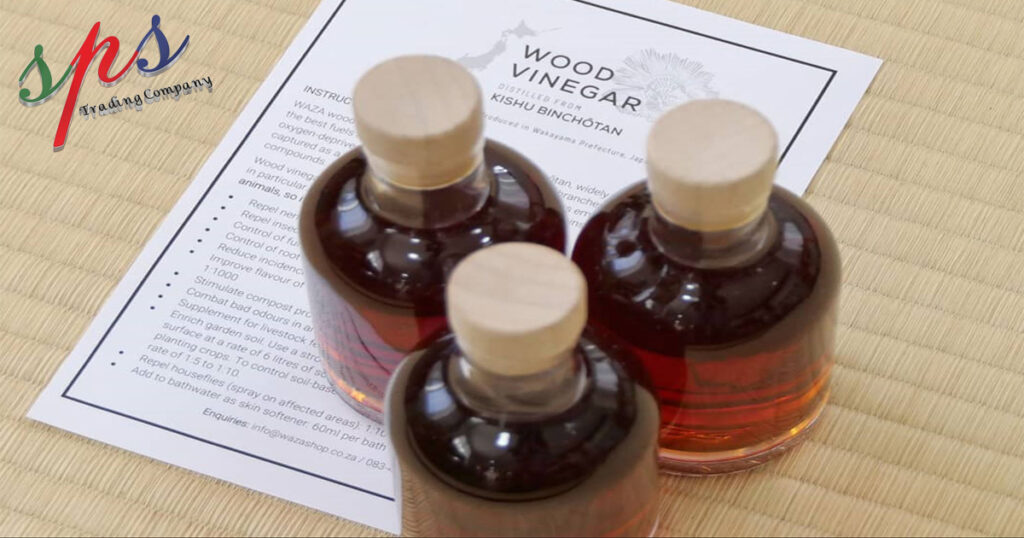Wood vinegar is a dark liquid produced by heating various types of cellulose and wood through a process called pyrolysis, which essentially involves burning in a vacuum environment and is also referred to as oxygen-free combustion or incomplete combustion. Factors such as temperature, pressure, time, and the type of raw material are important in the production of wood vinegar. Wood acid, liquid smoke, and pyroligneous acid are other names for this product.
Wood vinegar
Uses of wood vinegar:
1. Organic fertilizer and natural enhancer
- Strengthening roots, branches, stems, and leaves, and soil quality regulation
- Increasing soil fertility
- Increasing the speed of soil enrichment by fertilizer
- Reducing 50% of the need for fertilizer due to the maximum use of fertilizer in the soil
- Elimination of bad animal manure odor and facilitating the composting process
- Improving the color, taste, firmness, and shelf life of fruits
- Increasing sugar content in the product (sweet fruit)
- Increasing root absorption capacity
- Plant growth stimulation
- Reducing water needs (plant resistance to drought)
- Increasing plant resistance to specific and unexpected conditions and stresses
- Accelerating seed germination
- Reducing the need for fertilizer, increasing fertilizer efficiency
- Increasing plant resistance to various diseases
- Increasing beneficial microbes for plant growth and health
2. Organic pesticide and natural insecticide:
- Elimination of various pests
- Protection of plants against fungal, bacterial, and viral diseases
- Elimination of various plant insects
- Elimination of household insects, including flies
- Elimination of roundworms (used at the base of the plant)
- Prevention of root decay
3. Livestock feed additive:
- Improved taste and quality of meat and reduced cholesterol
- Regulation of the digestive system bacteria of livestock for better absorption of nutrients from animal feed
- Increased livestock fertility
- Increased milk production
- Other uses of wood vinegar:
4. Production of various drugs for animals (liquid smoke for honey bees, livestock dewormers, etc.)
5. Production of medical products such as adhesive pads for foot soles (for blood purification)
6. Manufacture of food preservatives (using various methods such as smoking or applying liquid to the product)
7. Use in the production of cosmetics and personal care products
Advantages and disadvantages of using wood vinegar:
Wood vinegar is produced naturally and does not harm the environment or living organisms. However, its use has numerous advantages, including:
- Wood vinegar is a healthy and inexpensive substance.
- This material does not harm nature.
- Its use meets the needs of plants.
- Wood vinegar increases plant resistance.
Determining the appropriate amount of wood vinegar:
Because wood vinegar is natural, it does not have any harm or disadvantages. However, this does not mean that you can use it in any amount. Excessive use of wood vinegar can lead to problems such as stunted plant growth and damage. Therefore, be sure to do the necessary research before using it.
To use wood vinegar, it is first mixed with a specific amount of water. Then, depending on the goals and conditions, different amounts of this liquid are used. For example:
- Using a ratio of 1:20 to the soil for pest control
- Using a ratio of 1:50 to the soil for weed control
- Using a ratio of 1:100 to strengthen stems, roots, and prevent rot
- Using a ratio of 1:200 to the soil to prevent pests and molds and faster plant growth
- 1:400 ratio for the plant to prevent aphids
- Using a ratio of 1:500 for fruit formation and growth enhancement
Packaging:
25 kg gallons (plastic barrels)
We are ready to supply your orders with the best quality

